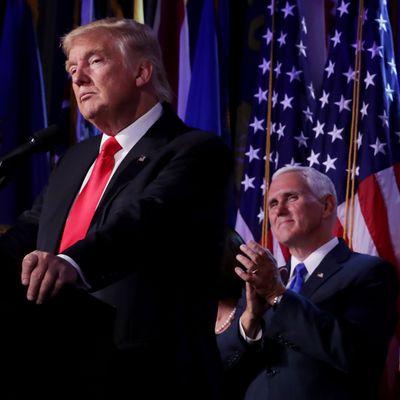
For two days, Donald Trump has enjoyed mostly good press — even from the New York Times — for saving nearly 1,000 jobs in Indiana by convincing Carrier, which makes air-conditioning and heating equipment, not to relocate an Indianapolis plant to Mexico. The terms of the deal were not announced ahead of the president-elect’s celebratory appearance at the Carrier plant on Thursday. The details that have emerged so far seem to confirm that the agreement — while wonderful for the several hundred Carrier workers keeping their jobs — is a troubling preview of how the Trump administration may conduct business.
Carrier, which is owned by United Technologies, announced in February that it planned to shut down an Indianapolis plant that employs 1,400 people. Shifting production to Mexico will save the company $65 million a year in labor costs. The move became a flashpoint in the campaign after video of the announcement went viral, and at rallies Trump promised to get tough on Carrier executives by threatening them with high tariffs.
The company said in a statement on Wednesday that it decided to stay “because the incoming Trump-Pence administration has emphasized to us its commitment to support the business community and create an improved, more competitive U.S. business climate,” adding, “The incentives offered by the state were an important consideration.”
Fortune reports that those state tax incentives amount to $700,000 a year, for several years, and will be offered via the Indiana Economic Development Corporation, a state agency. John Mutz, a member of the corporation’s board and a former Indiana lieutenant governor, said he was briefed on the agreement but could not confirm the final terms. However, he told the Indianapolis Business Journal that he doesn’t think the incentive package “really is the major reason for the decision.”
Months before he became Trump’s running mate, Indiana governor Mike Pence was trying to find a way to keep the Carrier plant open. Mutz says the IEDC offered similar deals earlier this year, but they were rejected by United Technologies.
So what changed? The election, obviously — but contrary to what Trump would have people believe, Mutz thinks the shift had little to do with the president-elect’s deal-making skills.
“United Technologies is a gigantic international company with many different divisions and subsidiaries, many of which do substantial amounts of business with the U.S. government,” Mutz said. “The dynamics are considerably different than they were even before the election. You’re talking here about a company that is trying to be competitive and also wants to keep their business with the government.”
For United Technologies, maintaining government contracts is a far bigger concern than keeping down labor costs, as CNNMoney explains:
United Technologies collects about $5.6 billion in annual revenue from U.S. government contracts, according to company filings, which is equal to about 10% of its overall revenue. United Technologies also relies on the U.S. government for a large chunk of the $1.5 billion in research and development grants that it receives from its customers.
Even a slight reduction in either of those sources of government funds would wipe out any savings United Technologies might see from closing the Indiana plants.
The Washington Post reports that United Technologies is a key supplier for the Pentagon, so its contracts probably would have been secure either way. However, the president-elect’s impact on business is particularly hard to predict this year, so it makes sense to stay on his good side.
Plus, Carrier can still shift hundreds of jobs to Mexico. It reportedly agreed to keep 1,100 jobs in Indianapolis — 800 manufacturing jobs and 300 engineering and headquarters jobs. The plant in Huntington, Indiana, will close as scheduled, and roughly 1,300 U.S. jobs will go to Santa Catarina, Mexico, where Carrier has already constructed a new plant.
As previously noted, the president-elect striking deals with individual companies sets a dangerous precedent, and is not a sustainable strategy for keeping jobs from going overseas. Even Carrier said in its statement that it still believes “the forces of globalization will continue to require solutions for the long-term competitiveness of the U.S. and of American workers moving forward.”
If Mutz is correct in his belief that United Technologies’ fear of losing government contracts played a large role in its decision, that adds another foreboding layer. As the Post’s Jim Tankersley explains, there’s evidence that handing out state subsidies to companies that plan to take jobs overseas isn’t smart even when governors do it, as “corporate subsidies tend to under-deliver on jobs promises, and they often advantage big corporations over small businesses and start-ups.”
But a governor can’t threaten to revoke federal contracts or impose tariffs targeted at individual companies. If that’s the sort of deal-making Trump engages in as president, then he’d be “heavily involved in picking economic winners and losers.”
Tankersley notes that’s the kind of thing that used to enrage Republicans in the early years of the Obama administration, when the president was pushing his economic stimulus bill and bailing out the U.S. auto industry. In fact, then-congressman Mike Pence attacked the stimulus, saying, “This back-room deal is simply a long wish list of big government spending that won’t work to put Americans back to work. It won’t create jobs.”
But that was seven years ago, and now the president-elect is a Republican, so who cares if these practices won’t put Americans back to work in the long run? Tomorrow Trump and Pence will be able to stand on a stage in Indianapolis and tell Carrier workers that they can keep making air conditioners.
Well, most of them. And the plant actually makes furnaces.






























